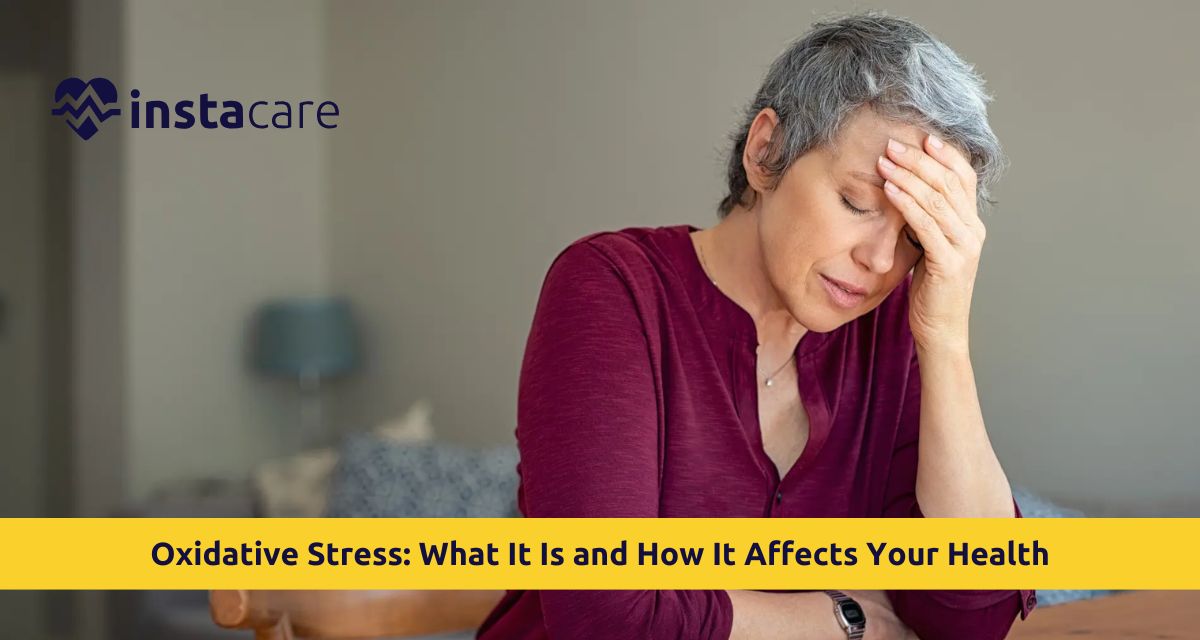What Is Oxidative Stress?
Oxidative stress shows up when the body struggles to match free radicals with antioxidants. Since these molecules carry unpaired electrons, they snatch electrons from healthy cells to steady themselves - damaging those cells along the way. Understanding oxidative stress and free radicals is crucial, as even though normal metabolism produces free radicals, excess amounts pile up and swamp the body's protection systems. This flood slowly damages organs and tissues.
This chemical imbalance in your system plays a role in various health issues - such as aging more quickly or ongoing diseases - since it throws off how your body usually works. Oxidative stress in the body affects nearly every organ system over time.
Causes of Oxidative Stress
The causes of oxidative stress stem from the body's normal processes, alongside factors such as pollution or food choices:
Internal Sources
Inside the body, normal cell functions create free radicals, particularly during energy production in mitochondria. When those mitochondria malfunction, they release extra free radicals while generating less energy for cells - linking directly to oxidative stress. Oxidative stress and mitochondrial dysfunction work hand in hand. The immune response,
inflammation, and even basic physical activity produce free radicals simply through everyday operation.
External Factors
Outside factors matter just as much - smoke and grime dump harmful stuff into the air, setting off trouble inside cells. When toxins from cigarettes flood in, the body can't keep up, overwhelmed by destructive molecules. UV light from the sun hits the skin, kicking off cell damage on the spot. Processed snacks, too much alcohol, certain meds, pesticides, or synthetic materials add pressure by ramping up rogue molecule production.
Lifestyle Contributors
Lifestyle things matter - chronic stress boosts cortisol, that in turn increases oxidative harm. When sleep gets messed up, the body struggles to produce antioxidants or repair cells properly. Going all out in training without proper rest overwhelms the body's built-in protection.
Effects of Oxidative Stress on the Body
Unstable molecules in your body interfere with almost every organ system, contributing to a range of health problems by triggering cellular damage over time:
Aging
Oxidative stress and aging: Free radicals wreck DNA, proteins, along with fats in cells, speeding up aging. Since this damage piles up over time, it results in wrinkles, organs that don't work as well, plus sluggish cell function later in life. A number of scientists think oxidative harm plays a key role in aging - so linked to the process they consider it crucial to bodily decline.
Inflammation
Oxidative stress links with inflammation - each one fuels the other. Oxidative stress and inflammation happen together: when cells get hit by oxidative damage, the body answers with an inflammatory response. That inflammation, in turn, triggers more free radicals to form. This cycle slowly damages cells over time. Eventually, it contributes to lasting inflammatory conditions.
Cardiovascular Disease
Unstable molecules tweak LDL cholesterol, which leads to buildup in artery walls - triggering plaque. Blood vessel damage from oxidation messes with circulation, making heart attacks or strokes more likely. Oxidative stress and cardiovascular disease are closely connected through these mechanisms.
Cancer
Oxidative stress and cancer: DNA damage from free radicals can set off mutations that start cancer. These changes link to oxidative stress through different paths - such as weakened cell repair or increased tumor growth.
Diabetes
Too much sugar in the blood ramps up harmful molecules. These wreck insulin function, which deepens diabetes - on top of that, surplus glucose adds fuel to the damage, driving complications ahead. Oxidative stress and diabetes create a damaging cycle.
Neurodegenerative Diseases
Since the brain burns a lot of oxygen and holds onto fat, it's more vulnerable. Oxidation damage shows up in Alzheimer's, Parkinson's, or even general mental fading. When stress from oxidation meets nerve decay, proteins misfold, neurons drop out, while thinking ability slowly fades. Oxidative stress and neurodegenerative diseases have strong connections.
Common Symptoms
Common signs: Oxide damage isn't always obvious, but you could feel worn out all the time, catch bugs often, struggle to recall stuff, see wrinkles or thinning hair, have blurry sight, get head pressure, or react badly to noise. These oxidative stress symptoms appear across different body systems.
Antioxidants: The Body's Defense System
Antioxidants tackle oxidative stress - think of them as protectors for your cells. When free radicals appear and stir things up, antioxidants and oxidative stress interact as antioxidants jump in, donating electrons to calm them down. These molecules stay steady after giving away electrons, never flipping out or becoming harmful themselves. This breaks the chain of damage quickly.
Endogenous Antioxidants
Inside your body, compounds such as glutathione, SOD, or catalase tackle damaging molecules. These built-in defenders work all day, holding shaky cells back.
Exogenous Antioxidants
Outside antioxidants from food give your body's natural defenses a hand. Take vitamin C or E - seen in fruits and nuts - they lower cell strain. Beta-carotene, along with selenium from greens or earth-fed foods, battles damage tied to dirty air. Plant-made polyphenols, say the ones in berries or tea, lend a hand in protecting body parts.
Measuring Oxidative Stress
Medics look at markers such as MDA, 8-OHdG, or glutathione to spot oxidative harm. These oxidative stress markers hint at illness risk or whether treatment's making a difference.
How to Reduce Oxidative Stress Naturally?
Simple changes in your routine or meals can help reduce oxidative stress in everyday life. How to reduce oxidative stress involves multiple approaches:
Dietary Strategies
- Chow down on antioxidant-rich picks like berries, spinach, nuts, sunflower seeds, or colorful peppers
- Grab omega-3s from salmon, flax, or perhaps walnuts - these fight off internal inflammation
- Ditch ultra-processed meals, lay off candy, steer clear of trans fats - they crank up cell damage
- Sip water all day so your insides run smooth and dump out the gunk
Lifestyle Modifications
- Keep moving, but not too hard - pushing yourself nonstop can hurt cells, while steady motion boosts your body's own shields
- Turn in early and get solid rest, because downtime lets you heal from daily stress and rebuild key defenses
- Chill out with quiet focus, gentle stretches, or deep breaths to slow things down
- Avoid smoke, also skip heavy drinking
Environmental Protection
- Stay safe indoors by running air filters - take quieter routes when smog hits
- Protect your skin from UV harm with daily sunscreen use
- Choose organic produce whenever possible, that way you're exposed to fewer chemicals
Supplementation
Getting nutrients from whole foods works best, although some folks may benefit from extra help - such as vitamin C, vitamin E, alpha-lipoic acid, or coenzyme Q10. Chat with a healthcare provider before trying any, since excessive amounts might interfere with cell signaling.
Medical Insights & Modern Research
These days, tackling oxidative stress means getting ahead of issues before they kick in or managing them as they pop up - rather than banking on a single magic solution. Oxidative stress treatment approaches keep evolving:
Targeted Antioxidant Therapies
Researchers are checking out unique antioxidant fixes for specific health problems. Rather than spreading all over, these compounds head directly to the mitochondria - giving support when cells face strain or act up. In a different direction, materials that activate Nrf2 push the body to strengthen its protection by creating extra antioxidants.
Personalized Medicine
Personalized medical care: Fresh methods to spot cell harm let physicians adjust treatments. Since certain folks get passed down less protection from stress, DNA scans reveal who might need more help.
Clinical Applications
Checking oxidative stress helps spot how diseases start or respond to drugs. Instead of just standard therapy, antioxidant approaches may add value for heart problems caused by oxidation,
diabetes driven by it, or mental conditions rooted in the same mechanism.
Research Limitations
Studies have boundaries: while oxidative stress matters in disease, popping antioxidant supplements often fails to deliver results in actual trials. This shows the connection among oxidation, defense chemicals, and health isn't clear-cut - so flooding the body with mega doses might not fix anything.
Emerging Research
Later on, researchers are looking at how not eating sometimes, cutting back on food, or sticking to set eating patterns could change the way our bodies handle oxidation. Other investigations explore exercise perks - like how mild strain from moving around may over time strengthen the body's defenses against harm.
Conclusion
Oxidative stress shapes how we age, not simply by matching antioxidants against free radicals, but through the cell's ability to manage harm. While minor stress of this kind is natural - maybe even essential - constant exposure builds up, causing deeper harm. Over years, that buildup links to stubborn inflammation, heart problems, cancer, diabetes, and disorders in the brain.
Here's the good side – what you eat, how you move, and where you spend time can change your body's response to oxidative stress. Packed meals full of plant-based protection, gentle movement throughout the day, managing tension smarter, catching solid sleep, or ditching toxic stuff could ease internal wear and tear as days go by. As research pushes ahead, personalized tools to monitor and adjust this balance may matter more when it comes to feeling well or tackling health issues later on.
Please book an appointment with the
best General Physician in Lahore, Karachi, Islamabad, and all major cities of Pakistan through
Instacare, or call our helpline at 03171777509 to find a verified doctor for your disease.











